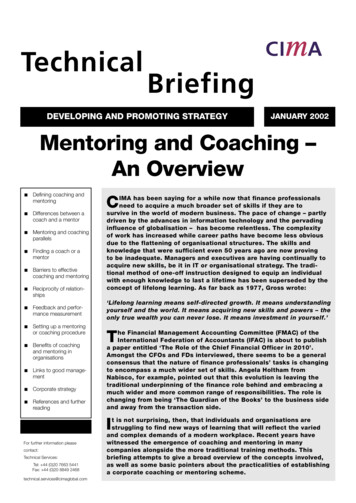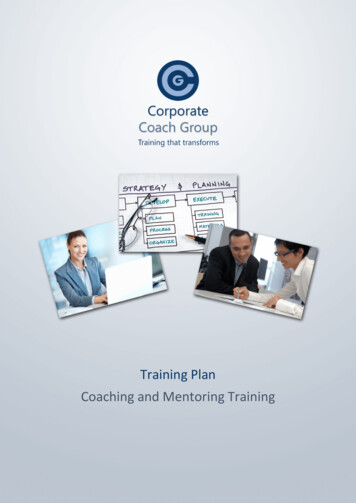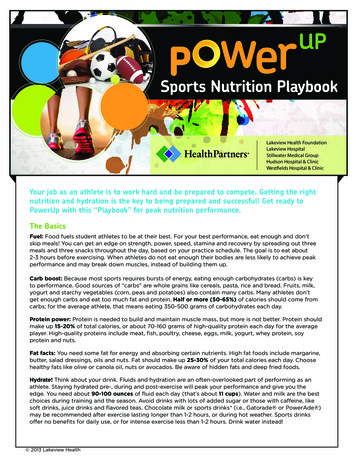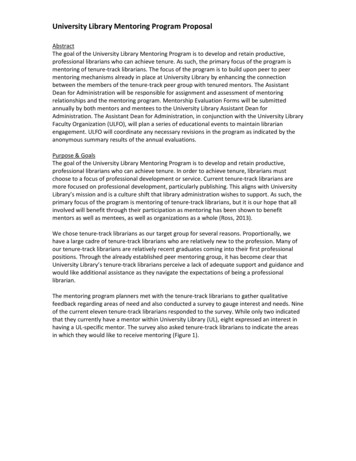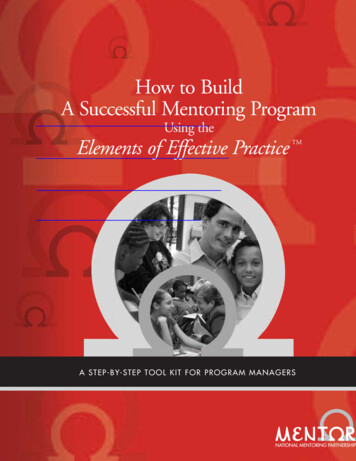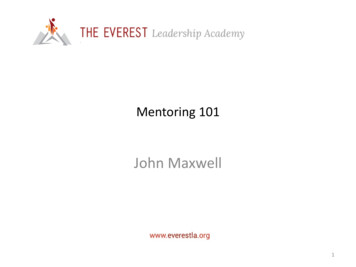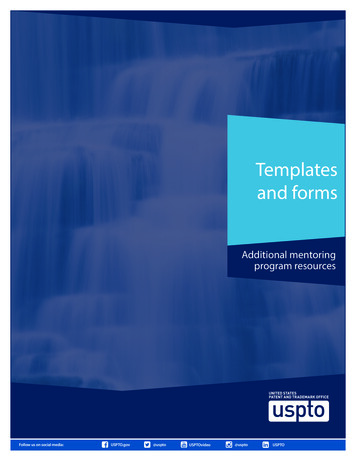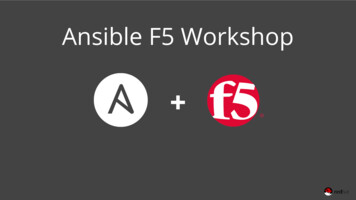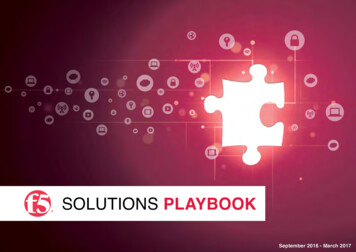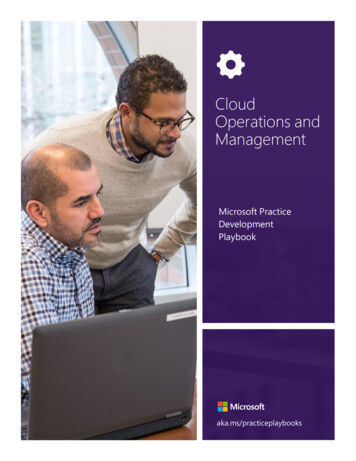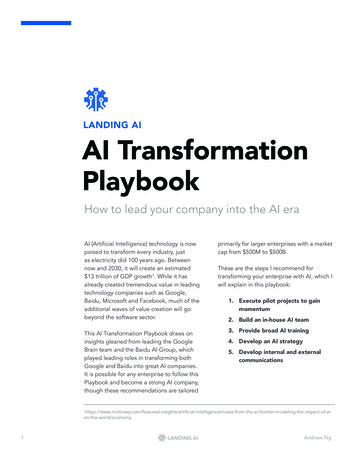
Transcription
Mentoring Playbook
Mentoring PlaybookTable of ContentsTable of Contents . 2Introduction. 3What is mentoring? . 4What are the benefits of mentoring? . 5What is the difference between mentoring, managing, and coaching? . 6What are the responsibilities of mentees and mentors? . 7Are you ready to be a Mentee?. 8Are you ready to be a mentor? . 9How do I find a mentor? . 10How do I Maximize the Mentoring Process? . 11What are the Phases of Mentoring?. 12The Foundation Phase (First 1-2 Meetings). 13The Mentoring Phase (Ongoing Meetings) . 17The Wrap Up Phase (Final Meeting) . 23Resources in myLearning . 26External Resources . 27Setting Up a Formal Mentoring Program. 28Index of Mentoring Tools . 35V1 March 20172
Mentoring PlaybookIntroductionAs a way of fostering talent at CBRE, this Mentoring Playbook provides general guidance and tools formentees, mentors, and mentoring program leaders and administrators. This Playbook will help: Mentees determine their readiness, find a mentor, and maximize the mentoring experienceMentors determine their readiness and maximize the mentoring experienceLeaders and administrators establish and manage a small-scale mentoring programThe majority of this Playbook is devoted to maximizing informal and formal mentoring relationships. Asmaller section provides general tools and guidelines for setting up and administering a mentoringprogram for internal groups that want to offer their members a structured program.If you need assistance that is not covered by this Playbook, send an email to Americas Learning &Development at ALDSupport@cbre.com.V1 March 20173
Mentoring PlaybookWhat is mentoring?At CBRE mentoring is an integral part of our culture. It is a voluntary professional development approachthat can contribute significantly to talent development, employee satisfaction and retention, and continuedcareer growth for both mentors and mentees.Mentoring occurs when a more experienced person (mentor) guides a less experienced person (mentee) to: Grow professionally in their career Enhance success in their current role Effectively navigate the company or the industry Address challenging situationsThe cornerstone of mentoring is the one-on-one conversation between the mentor and mentee. With afocus on the mentee’s needs, the mentor can help the mentee in a number of ways, including: CoachingGuidingProblem solvingOffering suggestions and feedbackProviding informationSharing resourcesSkill-building exercisesReflecting what they observeMentoring can be a one-time conversation, a short-term series of conversations, or a multi-yearrelationship. The majority of mentoring takes place one-on-one, but some mentoring programs offer groupmentoring where the mentor works simultaneously with a small group of mentees with similar interests.There is also “reverse” mentoring where the mentor is younger and/or less experienced than the mentee,but provides helpful insights, perspectives, or solutions.There are two general type of mentoring programs: Informal Mentoring has no direct corporate oversight or budget, and no formal expectations. It isusually initiated by an employee who seeks help, on an informal basis, from a more experiencedemployee. The mentor and mentee agree to work together on a one-time basis or over a period oftime, and establish their own expectations and agreements. This is the most common type ofmentoring that takes place. Formal Mentoring has formal expectations, a specific duration, and is overseen by an internalleader, department or group. It may or may not be supported by a budget. There is usually aformalized process for selecting and/or pairing mentees and mentors. There may be other programrequirements that supplement the one-on-one mentoring, such as coursework, projects, progressevaluations, and surveys. A portion of this playbook gives some guidelines on setting up amentoring program. If you need personal assistance with your mentoring program, contactALDSupport@cbre.com.V1 March 20174
Mentoring PlaybookWhat are the benefits of mentoring?Mentors and mentees consistently attest to the benefits of mentoring. Although specific benefits cannot beensured, the quotes and topics below show many of the common benefits of mentoring.“I deepened myunderstanding ofthe industry andthe company.”“I really enjoyedhelping my menteeand watching himgrow.”CrossCompanyNetworking“I think I learnedjust as muchfrom my menteeas she did fromme.”Greater JobSatisfaction“I finally felt incontrol of mydestiny, and mycareer seemed toreally take off!”“I have a muchgreater selfawareness as aresult of workingwith my mentor.”TalentDevelopment“I reached my goal– faster and with abetter outcomethan if I wouldhave done italone.”AcceleratedCareerGrowth“I’ve improved myability to facilitateconversations,which makes me abetter leader andmanager.”“I expanded mynetwork in ways Ididn’t think werepossible.”“Working with mymentee refreshedmy tentionV1 March 20175
Mentoring PlaybookWhat is the difference between mentoring, managing, and coaching?Based on information published by the CEB Learning & Development Leadership Council, mentoring,managing and coaching are similar, but also very different. This chart highlights some of the differences.COMPARISON OF pproachDurationFormal relationshipbetween a manager anda direct report. Themanager and directreport are assigned toeach other.The manager initiateswhat the employeefocuses on.Focus is usually ongetting work done,achieving goals, solvingproblems, anddeveloping theemployee’s job-relatedskills.The manager establishesthe goals, manages andevaluates employeeperformance, andprovides work-relatedresources and feedback.The relationshipcontinues until theemployee no longerreports to the manager.CoachingMentoringCoaching is part of amanager’s role, but can alsobe a voluntary activity donebetween two people who donot have a formal reportingrelationship.Either the coach or coacheeinitiates what they focus on.There should be no reportingrelationship between thementor and mentee.Participation is voluntary.If the coaching is taskoriented, the coach’s focus ison the coachee taking actionto complete specific workrelated tasks.Focus is on advancing thementee’s career by enhancingthe mentee’s awareness,knowledge, or skills.If the coaching is growthoriented, the focus is onbuilding the coachee’sawareness, knowledge orskills.Either the coach or thecoachee determine the goaland the approach,depending on the reportingrelationship and purpose ofthe coaching.The relationship’s durationdepends on the type ofcoaching and how quickly thecoachee’s needs are met.V1 March 2017The mentee initiates what thementor and mentee focus on.The mentee establishes thegoal. The mentor providesguidance, shares information,and may use growth-orientedcoaching strategies to drawout the mentee’s views.The relationship’s durationdepends on the mentee’sneeds. It can be a one-timeconversation, a short-termrelationship (a few meetings),or a long-term relationshipover many years.6
Mentoring PlaybookWhat are the responsibilities of mentees and mentors?All mentoring relationships differ from each other, but mentees and mentors have common responsibilities.The list below outlines, in general, the primary responsibilities of each role.MENTEESMENTORSDemonstrate Openness and WillingnessDemonstrate Care Lower your guard and take risks Show curiosity Listen and ask questions Listen deeply Explore your own insights and views Follow through on commitments Ask for help Maintain confidentiality Demonstrate RISE values Demonstrate RISE valuesTake Responsibility for the ExperienceExpand Mentee’s Awareness Drive the relationship Ask open-ended questions Participate actively and fullyDetermine the focus/agenda for meetings Explore the mentee’s strengths and valuesExplore mentee’s obstacles Initiate the conversations Reframe difficult situations Follow through on commitments Provide useful information and feedbackTake ActionInspire Mentee to Take Action Establish your desired outcomes and goalsPrepare and implement action plans Encourage clear and compelling goalsEncourage focused action toward those goals Reflect on your progress and results Ask for a commitment to actionMentors Do Not:Be respectful of your mentor’s time. Mentoringis voluntary. Supervise or manage the mentee Intervene in mentee’s workplace orperformance issues Actively seek new jobs for the menteeSponsor the mentee for a promotion oradvancementIn addition to the responsibilities listed above:1. Participation in a mentoring relationship is voluntary. Both parties are willing participants.2. Participation requires time, effort, and attention from both the mentor and mentee.V1 March 20177
Mentoring PlaybookAre you ready to be a Mentee?Anyone who wants ongoing guidance, support, or coaching related to career advancement or skilldevelopment can seek out an informal mentor regardless of experience, role, or tenure with CBRE.Mentees should meet the following minimum criteria before seeking out a mentor:1. Clear and compelling need that is important to address.2. Capacity to commit time and attention over multiple conversations.3. Highly motivated to receive support and take action.To assess your readiness to be mentored, fill out the Mentee Readiness Assessment.MENTEE READINESS ASSESSMENTYes1. I have a clear and compelling interest in advancing my career or developing my skills. 2. I will be open, transparent, and vulnerable when working with a mentor. 3. I am open to receiving direct feedback, guidance, and suggestions from a mentor. 4. I will take risks that challenge my comfort zone. 5. I will commit to multiple mentoring conversations (as agreed upon with my mentor). 6. I will follow through on exercises and action plans that help me address my need. 7. I will leverage the mentoring experience to the fullest extent possible. 8. I have my supervisor’s full support to participate in ongoing mentoring conversations. Total Number of YesesIf you responded with 7-8 Yeses, you are in a good position to be mentored.If you responded with fewer than 7 Yeses, an ongoing mentoring relationship may not be the bestapproach right now. Instead, consider one of these next steps: Search in CBRE’s myLearning for a skill or content area you want to develop further.Talk to your manager about your specific need. Create a development plan together.Meet with a subject-matter-expert who can help you advance your knowledge or develop a skill.Search public online booksellers for books in your area of interest.Search local or online education providers for courses that will address your need.V1 March 20178
Mentoring PlaybookAre you ready to be a mentor?If you are passionate about helping others advance their career, knowledge, or skills, you might make anexcellent mentor. Generally, the most effective mentors have ALL of the following characteristics:1.2.3.4.5.Sufficient experience or competency related to the mentee’s area(s) of need.Capacity to commit time and attention over multiple conversations.Highly motivated to help another employee with career advancement or professional development.Ability to maintain confidentiality and demonstrate the RISE values.In good standing with CBRE.Before agreeing to be a mentor, make sure you are a good fit based on the mentee’s needs and yourabilities and availability. Use the Mentor Readiness Assessment to assess your readiness.MENTOR READINESS ASSESSMENT1.I am motivated to help others grow professionally, advance their career, or develop skills.Yes 2.I have the necessary experience, knowledge, or skill to serve as a mentor. 3.I have demonstrated success at CBRE or in my industry/field. 4.I have the time and availability to participate in ongoing mentoring conversations. 5.I will generously share my experiences, insights, information, and resources. 6.I can give direct and honest feedback. 7.I understand that a mentor can have great influence; I take this responsibility seriously. 8.I appropriately model the RISE values as well as openness, transparency, and vulnerability. 9.I am willing to suggest exercises and actions that will help a mentee grow or move forward. 10. I will maintain the confidentiality of information the mentee shares. 11. I have my supervisor's full support to be a mentor. Total Number of YesesIf you responded with 10-11 Yeses, your readiness is high. If you responded with fewer than 10 Yeses, try: Searching in CBRE’s myLearning for a course that will help you get ready.Talking to your manager or your HR Manager about how to get ready.Focusing on improving your current work relationships.V1 March 20179
Mentoring PlaybookHow do I find a mentor?The process of finding a mentor begins with being clear about your desired outcome and ensuring that youare ready to be mentored.Mentors can be found within your network or throughout CBRE. Your next mentor may be someone youalready know or someone who is introduced to you by your manager, a peer, or a team member. Avoidasking your manager to mentor you because it can create an uncomfortable dual relationship.HOW TO FIND A MENTOR1. Determine your area of focus and desired outcome. What area do you want to focus on? What, specifically, is your desired outcome? Career advancement Professional growth (e.g., develop new skills) Enhance success in current role Effectively navigate the company or the industry Address challenging situations (e.g., difficult work relationship, work-life balance) Other2. Determine your readiness. Use the Mentee Readiness Assessment or answer YES to the following: Do you have a clear and compelling outcome in mind? Is mentoring the best way to achieve that outcome? Are you willing to take focused and decisive action toward achieving that outcome? Will you maximize the experience?3. Identify potential mentors. Use these questions to guide your thinking. Who do you admire, trust, and respect? Who has the experience, knowledge, or skills related to your area of focus and desired outcome? Who can you ask for suggestions? (e.g., your manager, the HR Manager, your colleagues, etc.) Does your mentor need to be in your local market?4. Have an informal conversation with each potential mentor. Hold a brief get-to-know-each-other conversation with each person. Describe your area of focusand desired outcome. Ask the person to share their related experience. Send a follow-up email to thank each person for their time.5. Did you find a potential mentor? If yes, send a follow-up email A) with details about what you are looking for and 2) ask them ifthey are willing to help you. If that person agrees, discuss next steps. If not, continue your search.6. Prepare for the mentoring relationship. Recommend that your new mentor use the Mentoring Playbook (available in myLearning). Use the Mentoring Playbook as a resource throughout the relationship.V1 March 201710
Mentoring PlaybookHow do I Maximize the Mentoring Process?Mentoring requires time, effort, and attention. Maximizing your experience – either as a mentor or mentee– should be a priority to ensure you are investing your time wisely and benefiting appropriately. The bestmentoring relationships have these key features: Honesty – the mentee and mentor should be willing to tell on themselves, articulate a difficult truth,share a challenging insight, transparently share something personal that may generate a feeling ofvulnerability. Honesty – with a mix of vulnerability and courage – are at the center of the mostpowerful mentoring relationships. Commitment – the mentor and mentee should both fully commit to the process and therelationship, and to ensuring that they each get the most out of the experience. Mutual Learning – mentees and mentors are both in positions to learn from each other and fromthe experience. When opportunities arise, the mentee and mentor are encouraged to share witheach other what they have learned. This type of mutual learning promotes vulnerability andrelatability. Agreements – the mentee and mentor should make up-front agreements and be willing to modifythem, as needed. Action – mentoring conversations can be powerful catalysts for mentees to grow and learn, butwhat the mentee does in between each mentoring conversation can be the difference between aso-so experience and transformative one. Structure – mentoring experiences do not need to be rigidly structured, but they should follow thegeneral structure described on the following pages: foundation, mentoring, and wrap up.V1 March 201711
Mentoring PlaybookWhat are the Phases of Mentoring?To ensure that you maximize the mentoring experience, you must first understand the three distinct phasesof mentoring. The model below outlines them and distinguishes between ongoing mentoring and a onetime conversation.THE PHASES OF MENTORINGFoundationMentoringWrap UpONGOING MENTORINGFoundationMentoringWrap UpFirst 1-2 Meetings:Ongoing Meetings:Final Meeting: Get to know eachother Help mentee meet needs, address challenges,achieve goals, build skills, and/or advancecareer Recap andcelebratementee’s progressand results Establish mentee’sneeds, focus, andgoals Mentee completes exercises, activities, andassignments in between conversations Establishagreements Provide feedback, information, insights, andresources Begin building trust Continue building trust Share mutuallearning Decide on postmentoringrelationshipONE-TIME CONVERSATIONFoundationSpend a few minutesestablishing thementee’s need, focus,or goal. Makeagreements for the restof the conversation, asneeded.MentoringSpend most of the conversation helping the menteemeet his/her established need. You can do this inmany ways including: Sharing information, feedback, or resourcesDemonstrating a skillMaking an introduction to someone elseCoaching the mentee to self-discover a solutionV1 March 2017Wrap UpSpend the final fewmoments sharing anymutual learning thattook place. Decide ifthere are any nextsteps for either ofyou.12
Mentoring PlaybookThe Foundation Phase (First 1-2 Meetings)FoundationMentoringWrap UpThe Foundation Phase begins when the mentee and mentor first discuss working together. Once they’vedecided to enter a mentoring relationship, then they should devote the first one or two meetings toestablishing a strong foundation.KEY ACTIVITIES FOR FIRST 1-2 MEETINGSRECOMMENDED ACTIONRESOURCE/TOOLEstablish an agendaSample Agenda for First Meeting13Get to know each other20 Questions to Get to Know Your Mentee14Establish mentee’s focus 15Establish and document agreementsCommon Mentee-Mentor AgreementsSMART ModelDevelopment PlanPage16Sample Agenda for First MeetingUse this agenda as a template for participating in your first mentor-mentee meeting.SAMPLE AGENDA FOR FIRST MEETING1. Get to know each other: Share your professional and personal backgrounds Share your interests and aspirations Describe your strengths2. Articulate what you each want to get out of mentoring3. Establish or clarify the mentee’s needs, focus, and goals4. Establish agreements5. Schedule next meetingV1 March 201713
Mentoring Playbook20 Questions to Get to Know Your MenteeThe list of questions below can be used to get to know your mentee. Refer to them during the first meetingor two, or use them throughout the mentoring relationship. Focus on just one or two questions at a time sothat you don’t overwhelm your mentee.20 QUESTIONS TO GET TO KNOW YOUR MENTEEThe Past1. What is your professional experience so far?2. What have you enjoyed most about your career so far?3. What books have influenced your ideas and thoughts the most?4. What or who inspired you to get started in your current role or career?The Present5. What is a current (or recent) project or situation where you excelled? What influenced your success?6. What magazines, newspapers, blogs, or other information sources do you study?7. What accounts for most of your success?8. How do you define defeat? How do you handle defeat?9. How do you define success? How do you handle success?10. Who is your role model? Why?11. What are your strengths? What is important to you?12. Who has had the most impact on your life? Why?13. Who are your personal and professional advisors or mentors? How do they each influence you?14. What professional or industry networks are you involved in? What level of involvement do you have?The Future15. When you think about the future, what do you dream about?16. What are your career aspirations and goals (short term and long term)? Why?17. How can I help you accomplish your career aspirations and goals?18. If you could change your life in one way, what would you change?19. Who are your personal and professional advisors or mentors? How do they each influence you?20. What do you hope I can provide you?V1 March 201714
Mentoring PlaybookSMART ModelThe SMART model is a standard tool for writing clear and compelling outcomes, objectives, goals, and tasks.SMART MODELWhen writing an outcome, objective, goal, or task, always make it: Specific: Are the words and actions specific, clear, and compelling? Do you know exactly what needsto be done? Measurable: Can you track your progress and measure success? Attainable: Is it genuinely attainable, given the timeframe, your abilities, other influences, and yourother responsibilities? Relevant: Does it support and relate to your needs or desires? Time-bound: Does it include a specific due date, duration, or frequency?Mentee Development PlanYou are more likely to achieve a desired outcome when you plan the steps to achieve it. Use theDevelopment Plans below as a template to outline your short- and long-term outcomes and the top 3 stepsto achieve each one. In some cases, a more detailed action plan may be needed.1-YEAR DEVELOPMENT PLANDesired OutcomeTop 3 Action StepsDue DateComments2-YEAR DEVELOPMENT PLANDesired OutcomeTop 3 Action StepsDue DateComments5-YEAR DEVELOPMENT PLANDesired OutcomeTop 3 Action StepsDue DateV1 March 2017Comments15
Mentoring PlaybookCommon Mentee-Mentor AgreementsMentoring relationships are more likely to succeed when the mentor and mentee make clear up-frontagreements. If the circumstances change, agreements can be modified.COMMON MENTEE-MENTOR AGREEMENTSArea of AgreementSuggestionsMentoring PeriodFor ongoing mentoring, start with an initial period of 3-6 months; extendthe period, as needed.Meeting FrequencyMeet twice per month or at a frequency that is appropriate for thesituation. Frequent check-ins are usually better than long gaps betweenmeetings.Meeting Duration30-45 minutes per meeting is usually sufficient, but sometimes longer orshorter durations are called for.Initiating contact/meetingsMentee should initiate all contact, but this can be negotiated.Cancel/Postpone MeetingGive 24-hour notice if cancelling or postponing a meeting.CommitmentBoth the mentor and mentee will honor their commitments to each other. Ifunable, they will provide advance notice and re-assess theircommitment(s).ConfidentialityAll information between mentor and mentee is kept confidential and is notshared or discussed with others without permission, to the extent allowedby CBRE Standards of Business Conduct.Mentor-Mentee ConflictsAddress all interpersonal conflicts proactively, directly, and respectfully.Work toward mutual understanding and common ground.Progress CheckDetermine how often you want to check on the mentee’s progress.Ending the MentoringHold a final conversation to wrap up the process and celebrate what bothof you have learned. Discuss the nature of the relationship going forward,such as: Continuing, but less frequent meetingsRedefining the relationship, such as colleagues or peersDoing reverse mentoring where the mentee becomes the mentorEnding the relationship with no expectations of further contactV1 March 201716
Mentoring PlaybookThe Mentoring Phase (Ongoing Meetings)FoundationMentoringWrap UpThe Mentoring Phase focuses on helping the mentee build self-awareness, establish resources, and moveforward in meeting established goals. With that in mind, each meeting may have a different structure orincorporate different activities. To allow for structure and flexibility, this section outlines generalresponsibilities for both mentors and mentees.MENTOR AND MENTEE ACTIONS FOR MENTORING PHASEMentee ResponsibilitiesResource/ToolEstablish an agendaMeeting Prep Guide18Establish next meetingN/AN/AMentor ResponsibilitiesResource/ToolUse a variety of conversational approaches tofacilitate the meetings Shared ResponsibilitiesResource/ToolAgree on actions, activities, and assessmentsthe mentee will do in between meetingsMentee Activities21Check-in on progressProgress Check20Address potential stallers and derailersMentoring Stallers and Derailers21Conversational ApproachesGROW ModelV1 March 2017Page182017
Mentoring PlaybookMeeting Prep GuideUnless negotiated otherwise, the mentee is responsible for establishing the agenda for each meeting. Usethe Meeting Prep Guide to help with the process.MENTEE MEETING PREP GUIDEMentee: Answer these questions to help you prepare your meeting agenda:1. What are you working on?2. What did you accomplish or learn since the last conversation?3. What struggles or obstacles did you face?4. What do you need help with?5. What questions do you have for your mentor?6. What do you want to focus on during the next conversation?Mentor Conversational ApproachesThere are many ways for a mentor to facilitate the meeting. Many mentors simply listen to what the menteewants, and then provide helpful information and resources. To interject more variety, consider theconversational approaches below.MENTOR CONVERSATIONAL s can help the mentee build self-awareness or gain a new perspectiveon their strengths and abilities. Take time to debrief any assessments the menteecompletes.BrainstormingMentor and mentee generate ideas without initially judging or editing themDrawingAsk mentee to draw an image that captures what he/she is talking about. This is agreat way to make abstract conversations more concrete.DemonstrationMentor demonstrates how to do something. Or ask mentee to demonstrate howhe/she does something.Role-PlayingMentor and mentee use role-playing practice how to handle a situationExploring valuesMentee shares a true story about a significantly fulfilling experience, personally orprofessionally. When the mentor listens carefully, some of the mentee’s values(what’s important to the mentee) should naturally surface.V1 March 201718
Mentoring PlaybookMENTOR CONVERSATIONAL APPROACHESApproachDescriptionGoal settingMentee uses the SMART model to ensure that a goal is clear and compelling. TheSMART model is: Action PlanningSpecific: Are the wording and the action specific, clear, and compelling?Measurable: Can you track your progress and measure success?Attainable: Is it genuinely attainable, given the timeframe, your abilities, otherinfluences, and your other responsibilities?Relevant: Does it support or relate to your needs, desired outcome, or goal?Time-bound: Does it include a specific due date, duration, or frequency?Mentee plans a set of actions to achieve a goal. Action plans include: A SMART goalSMART actions to achieve the goalResources to achieve each actionA completion dateCoachingInstead of providing information or advice, the mentor takes a coachingapproach by asking questions and providing encouragement. Refer to the GROWModel (Page 20) for more information.Information andResourcesProvide information and resources that help the mentee.Asking QuestionsUse open-ended questions that encourage the mentee to explore his/her ownideas, perspectives, and solutions. For example: EncouragementWhat would you like to accomplish?What are your ideas?If you could advise yourself, what would that advice be?How would you like to solve it?What’s really important to you?Why do you think that option will work?What do you like about that?How important is it?Sometimes a mentee just needs a little encouragement.V1 March
Either the coach or the coachee determine the goal and the approach, depending on the reporting relationship and purpose of the coaching. The mentee establishes the goal. The mentor provides guidance, shares information, and may use growth-oriented coaching strategies to draw out the ment
